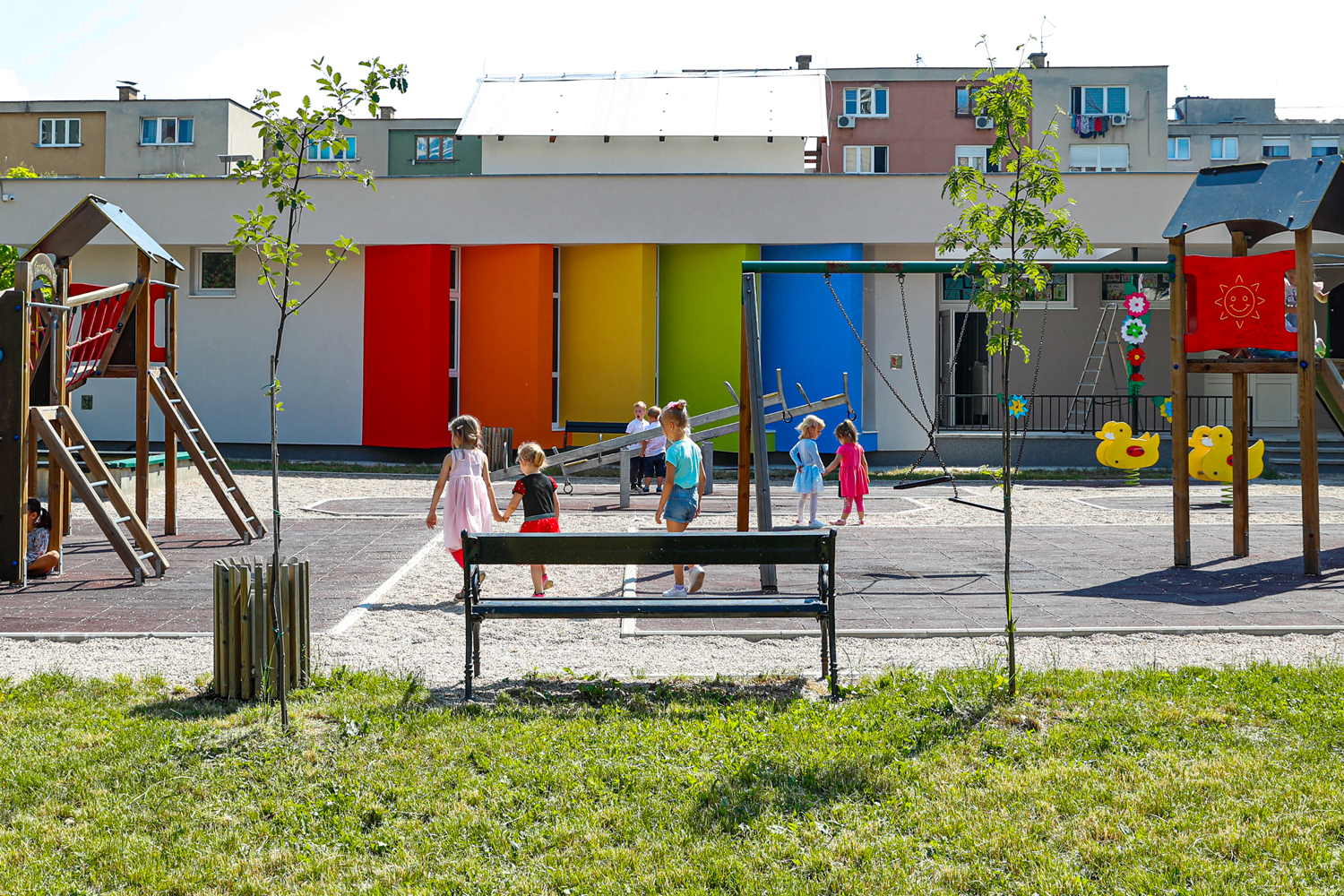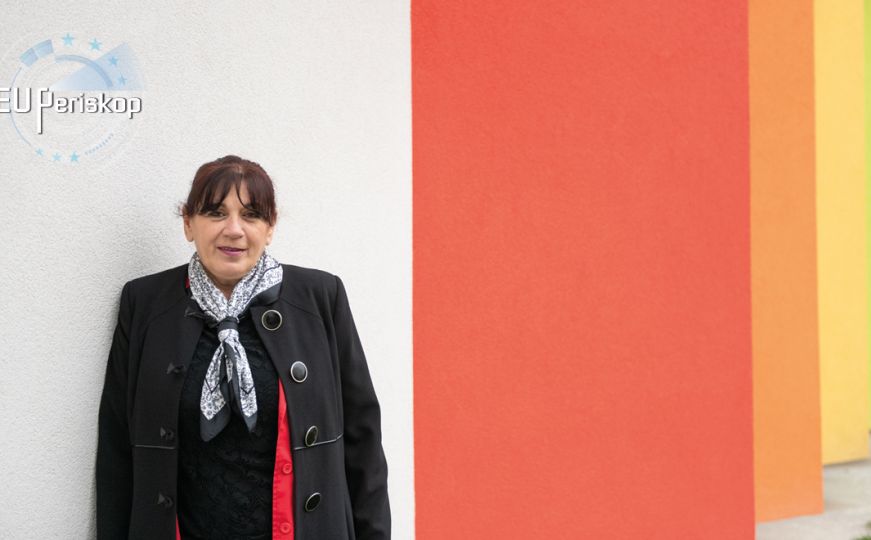
Bosnia and Herzegovina is a country characterized by significant energy inefficiency in its building, industrial, and service sectors. Public buildings in Bosnia and Herzegovina (BiH) have an average energy consumption three times higher than the EU average, rendering them completely energy inefficient. More than 70% of public buildings in BiH were constructed over 30 years ago, without much consideration for energy efficiency (EE). Moreover, over 80% of public sector buildings currently rely on fossil fuels or district heating systems, primarily coal-based.
Sarajevo, the largest city in the country with an estimated population of 360,000, is situated in the Sarajevo Canton. This regional administrative district encompasses the city of Sarajevo and its surroundings, with a total population of approximately 450,000. The Canton of Sarajevo heavily relies on electricity imports, accounting for 61.6% of its consumed electricity in 2021, while 38.3% was sourced domestically. However, there is progress in this area, supported also by the European Union through the “Energy Efficiency in Public Buildings in Sarajevo Canton” project.
“The EU is delighted to support the efforts of the Sarajevo Canton Government in tackling air pollution through numerous projects. For this specific initiative, which will lead to cleaner heating, improved insulation, and overall better conditions in schools, kindergartens, student dormitories, and outpatient clinics in the Sarajevo Canton, the EU is providing a grant of €2 million. This project represents an important stride towards a collective endeavour to enhance the environment and air quality in the Sarajevo Canton.”
Gilles Rebattet, Head of Operations, Section for Economic Development, Natural Resources and Infrastructure at the EU Delegation to Bosnia and Herzegovina
A significant boost to the energy efficiency of public buildings in Sarajevo is underway, thanks to a financing package of €10 million from the European Union (EU) and the European Bank for Reconstruction and Development (EBRD). The EU has granted €2 million, while the EBRD has contributed a €8 million loan for the refurbishment of 40 buildings in the capital of Bosnia and Herzegovina. These works are a priority initiative under the Green City Action Plan for the Sarajevo Canton.
The investments primarily focus on 29 schools and related facilities, six kindergartens, three student dormitories, and two outpatient clinics. The implementation of energy-saving measures is expected to result in estimated energy savings of approximately 13.7 GWh and an annual reduction of 4,774 tonnes of CO2 emissions. The energy efficiency measures encompass the introduction of cleaner and more efficient heating systems, improved insulation, better lighting, and overall enhancements.
One of the beneficiaries of this support is the Labudovi Kindergarten in Sarajevo, where energy efficiency works have recently been completed. These works involved thermal insulation of the facade, partial replacement of worn-out openings, installation of thermostatic valves on existing radiators, installation of calorimeters and automatic heating control with a circulating pump, replacement of inefficient lighting with new LED bulbs, and preparatory and accompanying measures for building renovation.
Gilles Rebattet, Head of Operations, Section for Economic Development, Natural Resources and Infrastructure at the EU Delegation to Bosnia and Herzegovina, attended the ceremony marking the completion of the works at Labudovi Kindergarten. He highlighted the detrimental impact of air pollution, which has significant economic consequences, reduces life expectancy, and increases medical treatment costs. “The EU is delighted to support the efforts of the Sarajevo Canton Government in tackling air pollution through numerous projects. For this specific initiative, which will lead to cleaner heating, improved insulation, and overall better conditions in schools, kindergartens, student dormitories, and outpatient clinics in the Sarajevo Canton, the EU is providing a grant of €2 million. This project represents an important stride towards a collective endeavour to enhance the environment and air quality in the Sarajevo Canton,” remarked Rebattet.

“Our kindergarten has truly received a wonderful makeover that distinguishes us. We have insulated the building and replaced all safety valves for heating, and I believe that both current and future generations will enjoy the beauty of our kindergarten.”
Špresa Zenoni, a preschool teacher at Labudovi Kindergarten
Labudovi Kindergarten in Sarajevo is the first facility to undergo a complete renovation, bringing better conditions for the little ones, reducing heating costs, and minimizing harmful emissions into the air.
“Our kindergarten has truly received a wonderful makeover that distinguishes us. We have insulated the building and replaced all safety valves for heating, and I believe that both current and future generations will enjoy the beauty of our kindergarten,” emphasizes Špresa Zenoni, a longtime preschool teacher at Labudovi. She adds that the insulation of the facility has provided a more pleasant and joyful environment for the children in the kindergarten.
About the project
The “Energy Efficiency in Public Buildings in Sarajevo Canton” project is being implemented as part of the Regional Energy Efficiency Programme (REEP/REEP Plus) for the Western Balkans. This programme has been identified as one of the flagship projects under the “Renovation Wave” in the “Clean Energy” investment window of the European Commission’s Economic and Investment Plan for the Western Balkans. These projects make a significant contribution to reducing greenhouse gas emissions and improving the living standards and health of citizens. The activities carried out under REEP/REEP Plus align with the EU Regulation and Green Agenda Targets for the Western Balkans, following the five pillars of the European Green Deal. The Regional Energy Efficiency Programme was established by the Western Balkans Investment Framework in 2012. Various organisations cooperate to make it a success, including the Energy Community, the European Bank for Reconstruction and Development, European Commission and KfW Development Bank. It comprises more than €600 million of investments from the EBRD and KfW Banking Group, which are combined with grants from the WBIF.
Photo credits: WBIF and EBRD
Sarajevo, the largest city in the country with an estimated population of 360,000, is situated in the Sarajevo Canton. This regional administrative district encompasses the city of Sarajevo and its surroundings, with a total population of approximately 450,000. The Canton of Sarajevo heavily relies on electricity imports, accounting for 61.6% of its consumed electricity in 2021, while 38.3% was sourced domestically. However, there is progress in this area, supported also by the European Union through the “Energy Efficiency in Public Buildings in Sarajevo Canton” project.
A significant boost to the energy efficiency of public buildings in Sarajevo is underway, thanks to a financing package of €10 million from the European Union (EU) and the European Bank for Reconstruction and Development (EBRD). The EU has granted €2 million, while the EBRD has contributed a €8 million loan for the refurbishment of 40 buildings in the capital of Bosnia and Herzegovina. These works are a priority initiative under the Green City Action Plan for the Sarajevo Canton.
The investments primarily focus on 29 schools and related facilities, six kindergartens, three student dormitories, and two outpatient clinics. The implementation of energy-saving measures is expected to result in estimated energy savings of approximately 13.7 GWh and an annual reduction of 4,774 tonnes of CO2 emissions. The energy efficiency measures encompass the introduction of cleaner and more efficient heating systems, improved insulation, better lighting, and overall enhancements.
One of the beneficiaries of this support is the Labudovi Kindergarten in Sarajevo, where energy efficiency works have recently been completed. These works involved thermal insulation of the facade, partial replacement of worn-out openings, installation of thermostatic valves on existing radiators, installation of calorimeters and automatic heating control with a circulating pump, replacement of inefficient lighting with new LED bulbs, and preparatory and accompanying measures for building renovation.
Gilles Rebattet, Head of Operations, Section for Economic Development, Natural Resources and Infrastructure at the EU Delegation to Bosnia and Herzegovina, attended the ceremony marking the completion of the works at Labudovi Kindergarten. He highlighted the detrimental impact of air pollution, which has significant economic consequences, reduces life expectancy, and increases medical treatment costs. “The EU is delighted to support the efforts of the Sarajevo Canton Government in tackling air pollution through numerous projects. For this specific initiative, which will lead to cleaner heating, improved insulation, and overall better conditions in schools, kindergartens, student dormitories, and outpatient clinics in the Sarajevo Canton, the EU is providing a grant of €2 million. This project represents an important stride towards a collective endeavour to enhance the environment and air quality in the Sarajevo Canton,” remarked Rebattet.

Labudovi Kindergarten in Sarajevo is the first facility to undergo a complete renovation, bringing better conditions for the little ones, reducing heating costs, and minimizing harmful emissions into the air.
“Our kindergarten has truly received a wonderful makeover that distinguishes us. We have insulated the building and replaced all safety valves for heating, and I believe that both current and future generations will enjoy the beauty of our kindergarten,” emphasizes Špresa Zenoni, a longtime preschool teacher at Labudovi. She adds that the insulation of the facility has provided a more pleasant and joyful environment for the children in the kindergarten.
About the project
The “Energy Efficiency in Public Buildings in Sarajevo Canton” project is being implemented as part of the Regional Energy Efficiency Programme (REEP/REEP Plus) for the Western Balkans. This programme has been identified as one of the flagship projects under the “Renovation Wave” in the “Clean Energy” investment window of the European Commission’s Economic and Investment Plan for the Western Balkans. These projects make a significant contribution to reducing greenhouse gas emissions and improving the living standards and health of citizens. The activities carried out under REEP/REEP Plus align with the EU Regulation and Green Agenda Targets for the Western Balkans, following the five pillars of the European Green Deal. The Regional Energy Efficiency Programme was established by the Western Balkans Investment Framework in 2012. Various organisations cooperate to make it a success, including the Energy Community, the European Bank for Reconstruction and Development, European Commission and KfW Development Bank. It comprises more than €600 million of investments from the EBRD and KfW Banking Group, which are combined with grants from the WBIF.
Photo credits: WBIF and EBRD
Please wait while your video is being uploaded...
Don't close this window!